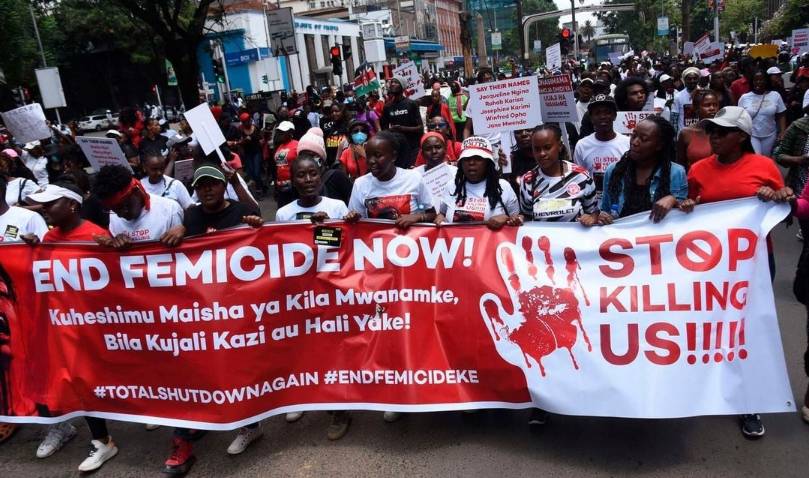Statistics from Africa Data Hub, a regional network of data organizations that traces killings based on newspaper reports, reveal that more than 500 women have been victims of femicide in Kenya between 2016 and 2024. Such data underscores a concerning trend, and the urgency for addressing and preventing violence against women.
Between 39 percent and 47 percent of Kenyan women experience gender-based violence in their lifetime, with these numbers calling for the need for societal awareness and proactive measures to ensure the safety and well-being of women. Its saddening that at least 14 women have been killed in January alone.
Femicide persists as a tragic phenomenal due its acceptance and tolerance. The occurrence of these crimes deeply rooted in societal issues such as inequality, discrimination and gender expectations, and the acceptance of violence against women contributes to the perpetuation of femicide. Activists have coined femicide as distinct form of violence noting that women are targeted because they are just women, justifying the acts of violence by blaming women’s sexuality, morality, behaviour, and appearance.
Cases dating back to 2018, such as the murder of Sharon Otieno, a Rongo University student, are still undergoing hearings. Former Migori Governor Okoth Obado, his personal assistant Michael Oyamo, and clerk Caspal Obiero are currently on trial for the murder of Sharon and her unborn baby, but formal charges are yet to be filed. To many, the protracted legal process feels like a denial of justice.
In January alone, at least fourteen women fell victim to violent killings, with some reports indicating as many as twenty-one deaths. Among them were Scarlet Wahu, a prominent online influencer, and Rita Waeni, a twenty-year-old university student who met a gruesome fate.
On February 15, 2024, two Nigerians initially arrested in connection with the murder of university student Rita Waeni, William Ovie Opia and Johnbull Asbour, were released. They had been detained to facilitate ongoing police investigations. The court, upon their release, instructed them to report to investigators weekly.
Recent incidents, including the killings of Scarlet Kanyari and Rita Waeni, have highlighted the pervasive issue of gender-based violence. It took sustained protests to draw significant attention to the matter. Since late January, Kenyan demonstrators have been demanding action to protect women, sparking nationwide discussions.
On January 27, thousands of Kenyan women took to the streets to demand an end to femicide. These protests, spanning various cities, marked the largest mobilization against gender-based violence in the country’s history. In the subsequent days, women continued their activism online, utilizing hashtags like #StopKillingUs, #EndFemicideKe, and #TotalShutDownKE to amplify their voices and express their outrage.
In Kenya, murder is primarily governed by the penal code specifically section 203-207 which states that “A person who is convicted of murder and proven shall be sentenced to death.”
These sections define murder, penalties and the circumstances that may affect the severity of the charge. The constitution of Kenya outlines the general principal of criminal law. It goes further and establishes a legal framework of how it should work. These are rights that cannot be taken away from a person, and it the duty of the state to safeguard the same.
Since the year began there has been a buzz around femicide which is defined as the criminal deprivation of the female’s life for reasons based on gender.
Scarlet Kanyari and Rita Waeni, among others, are tragic examples of individuals who fell victim to femicide. Despite the identification of their killers, charges have yet to be brought against them. While these victims have been laid to rest, their past is as significant as the futures they were deprived of.
Retributionists advocate for retribution, the punishment of individuals for their wrongful or criminal actions. They assert that the focus shouldn’t be on the potential benefits of punishment, but rather on acknowledging the harm that has been inflicted. Instead of asking “what good will it do,” they argue that the appropriate question is “what harm has been done.”
Considering the abolishment of the death penalty in Kenya three decades ago, the potential outcomes for perpetrators, if proven guilty, are as follows:
Life Imprisonment:
If convicted, perpetrators may face life imprisonment, a sentence that often includes a provision such as “25 to life.” This implies that they are eligible for parole after serving 25 years, after which they may be granted life parole.
Debate Surrounding Life Imprisonment:
While life imprisonment is practiced in Kenya, some scholars and legal experts argue that it is unfair and unconstitutional. Nevertheless, judges have the discretion to order life imprisonment or an equivalent sentence based on the evidence presented.
Consideration of Factors:
Before imposing a life sentence, various factors are taken into account, including the evidence presented during the trial.
Presidential Pardon:
In some cases, if a person exhibits good behavior while incarcerated, the President may exercise the power to pardon them, leading to their release from prison.
Early Release:
Additionally, individuals who have served a significant portion of their sentence and have demonstrated good conduct may be eligible for early release from prison.
These potential outcomes reflect the complexity and considerations involved in sentencing individuals convicted of serious crimes in Kenya’s legal system.
On January 27th, women and their allies took to the streets to protest against the alarming cases of femicide. Research conducted sheds light on how other countries address the issue once an individual has been found guilty. The team behind the protest presented a petition outlining measures to combat femicide to various government offices. Similar measures implemented in countries like South Africa were suggested as potentially beneficial for Kenya.
Since late January, Kenyan demonstrators have been vocal in their demands for enhanced protection of women, sparking widespread public discourse. Their demands include:
Presidential Declaration: A call for the President to officially declare violence against women as a national crisis.
Establishment of a Commission: Advocating for the establishment of a dedicated commission tasked with addressing and eliminating femicide.
Legal Reforms: Urging legislative reforms, including:
– Explicit definition of femicide and violence against women in the law.
– Affirmative action to provide comprehensive legal, medical, psychosocial, and other support to survivors and victims’ families.
Responsible Media Reporting: Requesting media outlets to adopt responsible and less sensationalized reporting on femicide cases.
Recognition of Femicide: Emphasizing that femicide should not be viewed solely as a “women’s issue” but rather as a societal concern deserving of serious attention.
Increased Resources: Calling for increased allocation of funds and personnel to the state department responsible for monitoring violence against women.
These demands highlight the urgency of addressing femicide in Kenya and underscore the need for comprehensive measures to ensure the safety and protection of women in society.
While the wheels of justice are said to turn slowly but grind exceedingly fine, the long costly tedious process can be gruesome especially to the families of the victims. While most families seek justice, the reality remains that they cannot bring back their loved ones. At the end of the day the system still moves on and gets unfair. This is because the amount of pain inflicted to the victims will never be compensated enough.
The Author, Gloria Nekesa, is a Second Year Communication Studies student at Chuka University.









